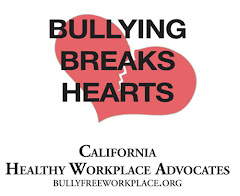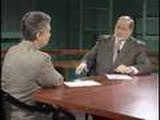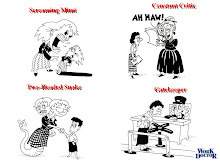http://www.latimes.com/news/nationworld/nation/la-na-workplace-bullying-20110319,0,1767245.story
State bills against workplace bullying gain traction By Tina Susman, Los Angeles TimesMarch 18, 2011, 7:51 p.m.
Proponents say workplace bullying is widespread and procedures for dealing with it are ineffective. They back a model called the 'Healthy Workplace Bill.'
Reporting from Annapolis, Md.—
Kathie Gant knew the relationship with her new boss was bad, but she didn't know how bad until the woman, a Maryland attorney, hurled a bundle of pencils at Gant, her administrative assistant. "You just don't sharpen my pencils for me!" the boss raged, punctuating each word with exaggerated enunciation and the zing of a pencil across the office toward Gant.
Months later, Gant was in a storage closet in the courthouse where she worked when the lights were shut off. "I turned toward the door and she was standing there," Gant said of the supervisor. "I tried to say 'Hey, I'm in here!' " Her boss stared back, shut the door, and locked it from the outside, trapping Gant in the pitch-black space.
After months of taunts and needling by her boss, Gant said she ended up on a psychiatrist's couch and nearly in a psych ward.
With a quavering voice and tearful demeanor, Gant testified about her job situation during a
legislative hearing this month at the state Capitol as Maryland became one of the latest states to consider legislation against workplace bullying. She recounted some details later in an interview.
Progress has been slow since California in 2003 became the first state to introduce a "Healthy Workplace Bill," which would give employees legal protection against those they say torment them at work (The measure died in committee). Since then, 19 other states have proposed similar legislation, though none has passed it into law.
David C. Yamada, a law professor at Suffolk University Law School in Boston and the author of the Healthy Workplace Bill, said laws protect workers from abuse only on the basis of such things as race or religion. Employees who do not fall into a protected category have no legal means of fighting bullying.
Opponents of legislation say employees already are protected by anti-discrimination laws and workplace rules against abusive behavior. They also say that human resources departments exist to help employees deal with workplace problems.
If all else fails, bullied workers can bypass their bosses and seek help from higher-ranking supervisors, said Champe McCulloch, president of the Maryland Assn. of General Contractors and a former human resources director at
Verizon.
"There's always an internal appeals process," said McCulloch, one of three lobbyists to speak against the bill on March 3 when it was introduced to the state Senate's finance committee. "At some point, the employee has to screw his or her courage to the sticking post and keep escalating the complaint up the management chain. I assure you ... at the senior management ranks, somebody is going to take action."
But proponents say that alleged bullying that may have led to highly publicized suicides last year — including that of a 52-year-old magazine editor who accused his boss of abusive behavior, and a 15-year-old schoolgirl who was taunted by classmates — have focused attention on the problem and galvanized efforts to pass legislation. So, too, has workers' frustration over several states' efforts to follow Wisconsin in curtailing the power of unions representing public employees.
While the suicide of Phoebe Prince, the Massachusetts girl, shed light on school bullying, Gary Namie of the Workplace Bullying Institute in Bellingham, Wash., said it underscored the need for legislation at all levels.
"If it is not stopped at childhood, it clearly progresses into adulthood," Namie said, citing a
2010 study by the bullying institute and the Zogby International polling company that indicated 35% of adults in the United States had been bullied at work. An additional 15% said they had witnessed workplace bullying. According to the survey, most bullies are men and most victims are women, but both sexes report being bullied by male and female bosses, and women are more likely to seek help from human resources.
"This year it's an especially uphill struggle," Namie said of workplace bullying legislation, citing "attacks on workers in general" in Wisconsin and other states proposing new limits on labor unions.
But Namie said he believes New York, where the state Senate passed a bill last year, is likely to get it signed into law in 2011.
"If New York becomes the first to pass it, that's a bellwether state, so others would follow," said Namie, a social psychologist who founded the institute 14 years ago with his wife, Ruth, after she experienced on-the-job bullying.
The Healthy Workplace Bill, used to guide individual states' proposed legislation, forbids a health-harming "abusive work environment" and requires medical documentation to prove worker claims of bullying.
Proponents of anti-bullying bills say this is among the measures that would prevent a flood of lawsuits by disgruntled employees.
Yamada, the Healthy Workplace Bill author, said workers face the challenge of trying to prove bullying, which generally falls short of physical assault and is Machiavellian and difficult to identify. "I liken our understanding of workplace bullying to where we were with sexual harassment three decades ago," Yamada said. "A lot of people have had to deal with this for years but didn't know what to call it."
Bill backers say internal appeals processes often fall short, citing the case of Kevin Morrissey, who was managing editor of the Virginia Quarterly Review magazine. Morrissey shot himself to death last June after relatives and friends said his — and others' — repeated complaints about a bullying boss were ignored. The
University of Virginia, which publishes the magazine, said it had handled the complaints properly and that the manager could not be blamed for Morrissey's death.
The recession has made it easier for bullies to carry on because jobs are scarce and employees are reluctant to quit or to speak up and be seen as troublemakers, bill proponents say.
Gant, who worked in a county courthouse, said that after a few months a new boss openly called her "stupid," humiliated her at meetings, and sent out office e-mails that belittled her work.
Gant is still at a loss to explain the behavior. Because much of the abuse was unseen by others — the pencil-throwing, the locking of the closet, the snide comments — it was difficult to make others realize how bad it was, she said.
"She was an attorney. I never felt she'd go that far," said Gant, who was haunted by the experience long after the woman's departure. One day, the woman returned to the office for a brief visit. Gant hid in an office until she was gone.
Gant remained on the job a few more months but has since taken another job that she enjoys. She said she also went back to school to study for a doctorate and bolster her self-confidence, "so if I ever see her again, I'll be ready."
tina.susman@latimes.com


























